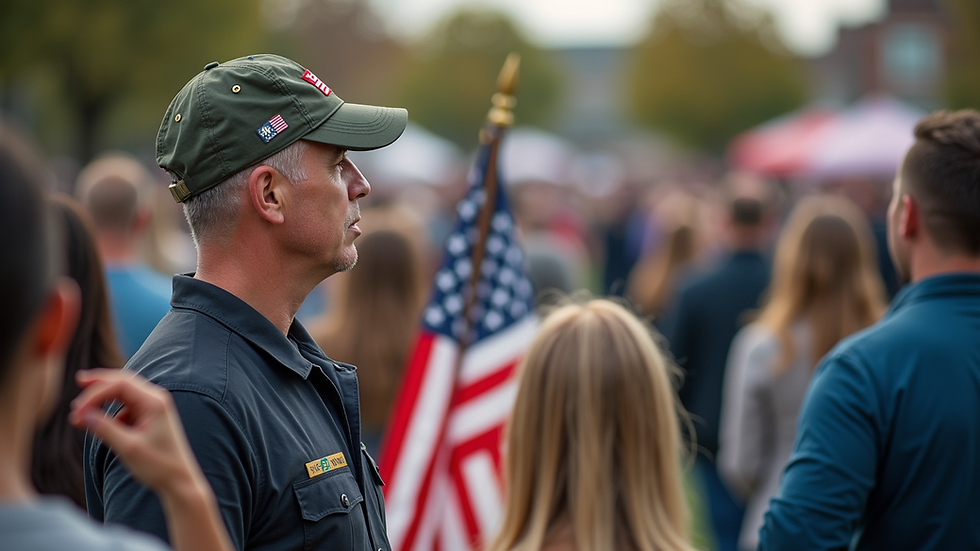How Communities Can Help Veterans Transition to Civilian Life
- Fire Team

- Jul 1, 2025
- 3 min read
Transitioning from military to civilian life can be challenging for many veterans. After serving their country, they face various obstacles, including finding employment, adjusting to new social environments, and managing mental health issues. One significant resource in this journey is the community—a powerful support network that can assist veterans in navigating these changes effectively.
The Role of Communities in Veteran Support
Communities play a vital role in ensuring veterans feel supported as they transition back to civilian life. Local organizations, groups, and even individual citizens can make a significant difference.
For starters, communities can offer mentorship programs that connect veterans with locals who understand the job market. These mentors can provide insights on resume writing, interview techniques, and industry-specific knowledge, which can be especially helpful for veterans who may not have experience in civilian job settings.
Additionally, community organizations often host job fairs tailored for veterans, providing a platform for them to meet potential employers. According to the U.S. Bureau of Labor Statistics, veterans' unemployment rates often fluctuate but tend to be higher than the national average during economic downturns. This statistic highlights the necessity for community-based initiatives that focus on creating job opportunities specifically for veterans.

Mental Health and Social Reintegration
Mental health is another crucial area where community support can positively impact veterans. Many veterans struggle with mental health conditions such as PTSD, depression, or anxiety. Communities can facilitate social reintegration through various programs focusing on mental wellness and camaraderie.
Support groups specifically aimed at veterans can provide a safe space for them to share their experiences and feelings. Through discussions led by trained facilitators, veterans can learn coping strategies and techniques to manage their mental health issues.
Local veterans' centers often partner with mental health professionals to offer workshops focusing on emotional well-being. These workshops may cover topics such as effective stress management, mindfulness techniques, and the importance of physical health—all essential for maintaining mental wellness.

Building Community Networks for Lasting Impact
To actively support veterans, communities need to establish strong networks involving businesses, nonprofits, and government agencies. Collaboration is key; when various entities unite for a common cause, they can create comprehensive programs that meet the diverse needs of veterans.
For instance, local businesses may provide apprenticeship programs that allow veterans to gain hands-on experience while earning a wage. This not only helps veterans develop new skills but also fosters relationships with community members who may eventually become lifelong friends or advisers.
Moreover, schools can initiate programs educating students about veterans’ contributions, igniting respect and curiosity in younger generations. Understanding the challenges being faced by veterans can help foster empathy and encourage more people to volunteer their time and resources.

Volunteer Opportunities and Engaging the Local Community
Communities can extend their support to veterans through volunteer opportunities as well. Volunteer programs that involve veterans allow them to continue to use their skills in impactful ways while re-establishing their place in civilian life.
For instance, initiatives such as community cleanup days or local mentorship programs give veterans a sense of purpose and fulfillment. Getting involved allows for interaction with civilians, breaking down barriers, and encouraging dialogue concerning the veteran experience.
Additionally, volunteering can help combat feelings of isolation that many veterans experience post-service. Engaging in community service can create lasting friendships and bonds with fellow community members, significantly impacting their overall well-being.
Transition Programs for Long-term Support
While the immediate needs of veterans are critical, long-term support programs also provide essential assistance. Opportunities such as continuing education classes, vocational training, and even business startup workshops can help veterans build sustainable futures.
Local colleges and universities frequently offer scholarships specifically designed for veterans. By taking advantage of these educational opportunities, veterans can transition into new careers, be it in technology, skilled trades, or entrepreneurship.
Programs that integrate veterans into local universities can create an environment ripe for learning and networking. This interaction not only aids in building new skills but also encourages veterans to share their unique experiences and insights, enriching the academic community.
Final Thoughts on Supporting Our Veterans
Fostering community support for veterans is essential in helping them successfully transition back to civilian life. The efforts of local organizations, businesses, and individuals can significantly impact both the mental well-being and economic success of veterans.
To truly support our veterans, we must understand their diverse needs and champion initiatives that address them. Whether it's through mentorship, volunteerism, or educational opportunities, our communities have the potential to provide vital assistance to those who have served our country.
By coming together, we can ensure that our veterans feel valued, understood, and equipped as they return to civilian life. Their sacrifices deserve recognition, and the collective efforts of communities can create an impactful change in their journeys forward.



Comments